- Home
- Alex Scarrow
TimeRiders: The Infinity Cage (book 9) Page 22
TimeRiders: The Infinity Cage (book 9) Read online
Page 22
She stared at him, silent for a long while. Then finally she closed her eyes. ‘I’m a complete frikkin’ idiot.’ Her head drooped down until her forehead softly thunked against the railing. ‘How many times have I screwed up now?’
He put an arm round her shoulders and looked back at Becks, standing guard by the picnic table. ‘No, you are not. It’s not like our walking computer over there figured that out either. Anyway … back in London we did not know where to begin looking for him. We had to come out here and identify the location first.’
‘I … should have planned it all better. If I’d done my job properly, been smarter, we’d have beaten the virus. We should’ve got to Waldstein before it caught up with us.’
‘We were working blind back in 1890. You had nothing to work from, Maddy. No information. No data. Nothing.’
She lifted her head and turned to look at him. ‘Or maybe I should have just listened to Liam and forgotten about this dumb idea of coming to find Waldstein?’
‘There would still be the Big Unknown Thing. Why is it there? Why is it transmitting a beam of particles down through the middle of the Earth? Who put it there?’
He emptied the last drops of the can into his mouth and then tossed it over the rail. ‘Waldstein may know about them … he must know. Anyway –’ he squeezed her shoulder tenderly – ‘you finally got an invitation from your creator to come and see him. Who could possibly ignore that? To any mortal being, is that not like being summoned by God?’
She laughed. ‘See? You can do philosophy!’
He rolled his eyes and shook his head. ‘Don’t insult me.’
CHAPTER 39
First century, Jerusalem
Liam chanced another quick look over his shoulder.
They’re still following us.
The young man from the tavern seemed to be eagerly leading the pursuit through the busy marketplace. Beside him was the man with the thick dark beard; both seemed to be talking animatedly to each other as they made every effort to keep up with them, but at the same time kept a respectful distance a dozen strides behind them. Both seemed excited: grinning as they talked, slapping their chests for emphasis, waving their hands.
Behind them, a tail of the curious was gradually growing: old, young, male and female. Dammit … the young man was even calling out to people they passed.
Bob’s internal compass was steering them northwards through the busy upper city. To their right, the walls of the temple and Fortress Antonia loomed ominously above the low rooftops. They were heading for the north entrance. If they reached it, it would take them through the market at the base of the steps leading up to the compound. Too close for comfort, and a fair probability that some of the tradesmen down there selling their overpriced sacrificial offerings, and the many pilgrims doing the buying, might have been among those who had witnessed things earlier this morning.
Liam was tempted to break into a run and try to lose their growing Pied Piper trail of followers. But running would get them noticed. Running would make people stop and look and try to see what they were fleeing from. As it was, Bob’s size was drawing enough attention – the people they brushed past doing a double take at his height and width.
Every now and then he caught comments uttered just behind their backs, people wondering if that was the same giant man the Romans had spent the day combing the streets for.
They weaved their way through an open area full of low-fenced paddocks containing goats and chickens. On the far side of it was the crenellated inner wall of Jerusalem, known as the wall of Hezekiah. Liam had the rough layout of the city in his head. This one ran west across the city from the corner of Fortress Antonia to the western entrance. Beyond was the suburb of Bezetha, the ‘new buildings’ of the city. And that northern part of Jerusalem was contained within the most recently built outer wall, the wall of Herod Antipas.
They made their way through the pens, Liam feeling horribly exposed with nothing higher than his waist around them. As they reached the shadows beneath the wall, he chanced another look back.
There they were: a growing, gabbling, excited crowd, picking their way through the low paddocks. Perhaps this knot of people was going to be spotted by one of the Roman sentries on the wall above. If they were lucky, a patrol would be quickly despatched from the fortress to intercept them and disperse them.
Dammit. Where’s a Roman when you need one?
They emerged into the afternoon sun on the far side of the wall. The buildings were newer, taller, the streets wider and cleaner. Clearly a more affluent part of the city. Aspiring to Roman inclinations towards grid-like order. Liam wondered if their growing band of peasant followers might be halted at the wall by some neighbourhood guards. He could imagine the poorly dressed crowd behind them wouldn’t be encouraged to venture en masse to this side of the wall.
As they approached an intersection of busy thoroughfares, Liam finally heard a deep commanding voice belting something out in Latin from behind.
‘Stop!’
His first instinct was to sigh with relief. Somebody was stopping the rabble at the archway. Then there was more. ‘You two! Stay right where you are!’
He stopped and turned round to see a centurion at the head of a patrol of legionaries. Alone, he strode across the busy intersection towards them, chain mail jangling, one hand resting on the hilt of his gladius, the other casually swinging a small vine-stick. A dozen yards short of them he came to a halt.
He craned his neck forward and shaded his eyes with one hand. Then all of a sudden he reached for a bronze whistle on a tether round his neck and blew sharply.
The legionaries trotted over to join him.
‘You!’ He pointed his stick at Bob. Bob looked at Liam.
‘Me?’ asked Liam.
‘No, you! You big ox! Under orders from the prefect of Judaea, you’re under arrest!’
Liam was about to suggest to Bob they just turn and make a run for it, but a chorus of barracking voices diverted the centurion’s attention. He turned to see a crowd of people emerging through the archway beneath the wall. They spread out across the street. Liam hadn’t realized how many people had joined the band of followers they’d been trailing behind them. There had to be seventy, perhaps eighty, people.
‘You sewer rats! Get back through that gate!’ the centurion bellowed at them in gutter Latin.
He was answered with jeers and curses from across the busy thoroughfare. The crowd that had spilled into this more affluent suburb now fanned out and stood on the far side of the paved road, keeping a wary distance from the Roman patrol in case the centurion blew on his whistle again and ordered his men to charge at them. The mob’s defiance was cautious … wary … but balanced on a knife edge. Bob, meanwhile, lurched menacingly forward and growled at the legionaries.
Either these men had witnessed him this morning, or they’d heard about it from their battered colleagues. They backed up a step. And that was enough of an enticement for the Judaean peasants. They spilled forward, gathering round Liam and Bob.
‘Go back to your fortress, you Roman mongrels!’ shouted an old man beside Liam, shaking his walking staff at them.
The centurion issued an order to one of his men. The man put down his shield and javelin and began to run off in the direction of the fortress. The centurion then turned to the rest of his men and barked an order. They closed up together, presenting a solid wall of twenty shields.
‘This … man is under arrest!’ he said, pointing his stick at Bob again.
A small lump of masonry arced over their heads, broke into pieces mid-air and clattered harmlessly down on to the helmets of some of the legionaries.
The centurion shook his head wearily. ‘Hold fast, men!’
The young man who’d been following them from the tavern pushed his way through the crowd and stood before Liam. ‘There will be more Romans. They will come from the fortress quickly!’
‘We are trying to leave the city,’ replied Liam. ‘W
e’re not here to cause any more trouble.’
More hunks of masonry and stone were being pulled from the street by the mob, and began to arc through the air, rattling down against the wall of shields.
‘But you did! This morning! You and –’ he glanced at Bob – ‘this man, together you showed the priests we are not the fools they think we are! We were not just stupid cows to be milked. The news of what you did is all over Jerusalem!’
‘That was …’ Liam was about to try to explain again that the man who had actually been the courageous one … the man who had started the riot was a man called Jesus. As if mention of that name should be enough to clarify the misunderstanding. But, of course, Liam was beginning to realize that at this moment in time Jesus of Nazareth was still an unknown figure. He was just one of many rabble-rousers and firebrands walking from town to town, harnessing the growing discontent bubbling away in Roman-occupied Judaea. All that the common people of Jerusalem knew of Jesus – before this morning – was that he was a particularly compelling speaker, that he was from Nazareth … and that the priests had been getting increasingly twitchy over rumours that this particular troublemaker’s meandering tour of small towns was going to conclude with a visit to the city.
‘Your words … your words reached us before you arrived! The people will follow –’
‘You don’t understand! They’re not my words!’
‘They are your father’s!’ The young man smiled. ‘I know! We know who you claim to be!’
The mob was beginning to spread out, to find its voice, to gain confidence. One or two passers-by, seeing a comfortingly small number of Romans being harangued and challenged for once, started to join in. Hurling abuse, hurling stones.
The centurion was looking over his shoulder anxiously, clearly hoping that reinforcements were coming soon. The crowd was beginning to extend round the ends of the short shield wall, sporadic missiles now coming in from the sides. He barked another order and the shield-wall formation quickly closed up into a tight square.
The thickly bearded man from the tavern emerged from the noisy crowd. He grasped the young man’s arm. ‘There WILL be many more Romans! Linus, this giant can’t kill them all!’
The young man nodded. He looked at Liam. ‘You should leave here while there is still time!’ He pointed at the wide streets. ‘The Romans will block all of these. You will be trapped in the middle and then they will arrest you.’
‘We need to get out of the city!’ replied Liam.
‘All the entrances have been sealed today,’ said the bearded man. ‘They will not let anyone in or out!’
‘Come with me!’ said Linus. ‘I can hide you! Shelter you!’
CHAPTER 40
2070, Rocky Mountains
‘Oh my God, Rashim … is that someone else up ahead of us? Look! Over there!’
Rashim narrowed his eyes as he looked up the winding road. Sure enough, standing at the top of it there was someone there. ‘It looks like he is carrying a gun.’
They continued heading uphill towards the figure. Walking slowly, cautiously. Closer, Rashim could see more detail. The figure was clad in a chunky bright orange anorak, a bright pink woolly hat and a matching scarf wrapped round the face. The lone figure had spotted them too, unslung the rifle and with some effort had attempted to shoulder the heavy weapon and aim it at them.
They stopped fifty yards short. Maddy spread her hands out in front of her, palms out and making clear she was not holding anything. ‘Hey! It’s OK! We’re not armed!’
The figure dropped its aim slightly. The gun looked a size too big for it.
‘DAD!’ They heard a high-pitched voice squeal. ‘There’s strangeeeerrrrrs!’
‘It’s a kid,’ uttered Maddy.
‘It is a girl,’ added Rashim.
They saw a bright flash of orange, movement among the forest of uniform, lifeless grey tree trunks. Someone was sprinting this way, weaving through the trunks towards the road.
‘Dad!! Strangeeeeerrrrs!!’ the girl cried again.
The man finally staggered out on to the gravel road, a hunting rifle held ready to use in both his hands. His face was hidden by a scarf and the hood of his anorak was pulled up. Clouds of condensed breath puffed through the material.
‘It’s OK, Troy! I’m here now, hon. I’m here!’ He aimed his rifle at them. ‘None of you lot move!’
‘We’re not armed!’ said Maddy. ‘We don’t have any weapons on us.’
The man’s aim wandered from her to Rashim and Heywood. ‘Any of you people showing signs of infection?’
‘No.’
‘Skin lesions or discoloration? Vomiting? Nausea?’
‘No. Nothing.’
The man lowered his aim slightly. ‘Where’ve you come from?’
‘We came down from Denver,’ replied Maddy.
‘They got this thing up there too, haven’t they? All the broadcast digi-streams coming from there went down four days ago.’
‘I think it’s everywhere now.’
‘You’re the first survivors we’ve come across in a week,’ added Heywood.
The man’s rifle dipped a little more. ‘Same here.’ He turned to look at his girl. ‘What do you think, Troy?’
She craned her neck slightly; looking round Maddy and Rashim, she spotted Charley cowering half hidden behind one of Becks’s legs. ‘They got a kid with them, Dad.’
He kept his weapon raised, his eyes darting from one person to another. Eventually the tip of his barrel dropped slightly. ‘I guess that swings things, huh?’
She shrugged in reply. Then, as an afterthought, she nodded. ‘They look friendly.’
The man lowered his gun all the way down, tugged away his scarf and pulled back his orange hood to reveal scruffy, fine sandy-coloured hair and a thick dark beard. ‘I’m Duncan. This is my daughter, Troy. It’s just the two of us up here … now.’ He narrowed his eyes. ‘Can I trust you people?’
‘I hope so.’ Maddy sighed. ‘It’d be a pretty sad thing for mankind if the last of us can’t even get along.’
Duncan Wassermann explained that he and his daughter were hunkered down in an old camping park just a mile up the road.
As they picked their way wearily up the winding gravel road, he was keen to tell them his story. He worked for the FSA’s intelligence agency located at a military base near Colorado Springs. He was employed as a threat analyst. Or, more to the point, he had been. Past tense. Everything was said with the past tense now.
He told them he’d known something like this was imminent. He told them how there’d been several months of encrypted radio and digi-net traffic going to and from several sources in North Korea. Even before the naval showdown over the oil reserves in the Pacific. The traffic went right across his desk and Duncan Wassermann had been quite certain the North Koreans were planning some bioweapon outrage. The Ruling Committee of generals had been carelessly using a transparent and blatant codename for their bioweapon: White Death.
‘Those ass-hat generals were debating how, where and when to deploy their wonderful doomsday bioweapon right up until the last moment.’ He shook his head. ‘The idiots were flinging emails to each other from their survival bunkers.’
He’d told his superiors in the last few weeks that he’d been growing increasingly worried the escalating war with the Pacific Union was going to result in those maniacs releasing something horrific. ‘God knows how many times I flagged that traffic to the department head. But as far as I know they didn’t do a goddamn thing about it.’ He sighed. ‘Last communication I sent up to them was another coded phrase. It was some kind of countdown message. I reckon they had this damned virus already smuggled into dozens of places around the world and they just all smashed their glass vials at the same time. That’s how it spread so damned quickly.
‘Anyway, three weeks ago … I decided I wasn’t going to wait around to see if I was right. I grabbed the kids, the wife, and we came up here.’
They turned a
corner in the road and up ahead was an entrance sign stretching across the road. WELCOME TO BLUE VALLEY CAMP. They passed beneath it. The campsite was set alongside a small man-made lake. Dozens of derelict family cabanas were arranged in circles round barbecue pits. Alongside the lake, the dirty fibreglass hulls of sailing dinghies rested on rusting trailers with flat perished tyres, and nylon halyards clattered noisily against aluminium masts with a rhythmic tap.
‘This place was still open when I was a kid back in the forties. We used to come up here for the summer break, back when the skies were mostly clear and still kind of an off-blue.
‘I brought with us a tow trailer loaded up with drinking water and dried food. And there was a store cabin up here with some decades-old but still perfectly safe canned food.’ He puffed his cheeks. ‘What with the hunting rifles, I figured we stood a pretty good chance of riding this whole thing out.’
Maddy looked at him. ‘And it looks like you did.’
‘No.’ He looked away. Clamped his lips shut. ‘No, not all of us.’
The Wassermann family had made the camp’s general store their survival bolthole. Bedrolls were laid out across the floor; a wood burner sat in the middle with a cooking frame erected over the top. Duncan poured a packet of dried soy-flake stew into a pot of boiling water suspended over the wood burner. He stirred it in vigorously.
‘We brought enough supplies here for six months, easy,’ he said. ‘You know, I was half expecting this camp to be overrun with people who also knew it was up here. But it was just us.’ He smiled. ‘Couldn’t believe our luck.’ He glanced at his daughter. She was sitting with Charley on the far side of the room; both girls were chatting quietly about something, flicking through glowing images on an old digi-tablet.
‘So … uh …’ Maddy wanted to ask him about the others. He’d said ‘kids’, plural. He’d mentioned his wife.

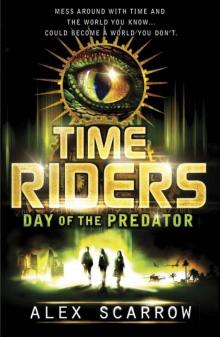 Day of the Predator
Day of the Predator Ellie Quin Book 3: Beneath the Neon Sky
Ellie Quin Book 3: Beneath the Neon Sky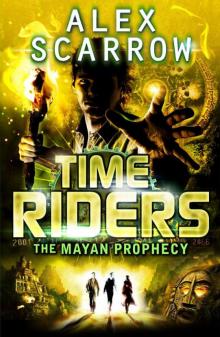 The Mayan Prophecy
The Mayan Prophecy October Skies
October Skies Ellie Quin Episode 4: Ellie Quin in WonderLand (The Ellie Quin Series)
Ellie Quin Episode 4: Ellie Quin in WonderLand (The Ellie Quin Series)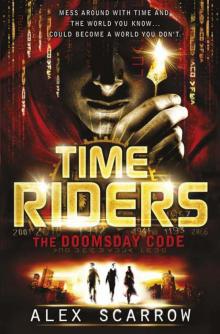 Time Riders
Time Riders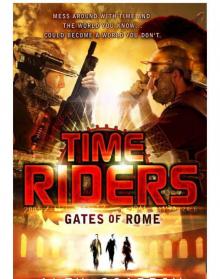 Gates of Rome
Gates of Rome Reborn
Reborn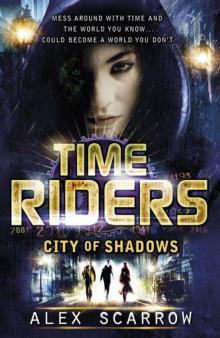 City of Shadows
City of Shadows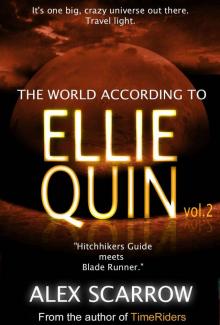 Ellie Quin Book 2: The World According to Ellie Quin (The Ellie Quin Series)
Ellie Quin Book 2: The World According to Ellie Quin (The Ellie Quin Series) Ellie Quin Episode 5: A Girl Reborn
Ellie Quin Episode 5: A Girl Reborn Spore
Spore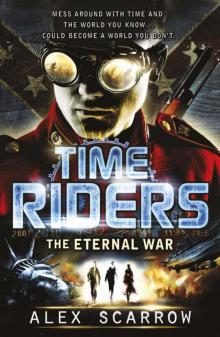 The Eternal War
The Eternal War Last Light
Last Light Remade
Remade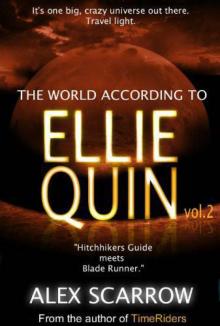 Ellie Quin Book 2: The World According to Ellie Quin
Ellie Quin Book 2: The World According to Ellie Quin Ellie Quin Book 3: Beneath the Neon Sky (The Ellie Quin Series)
Ellie Quin Book 3: Beneath the Neon Sky (The Ellie Quin Series)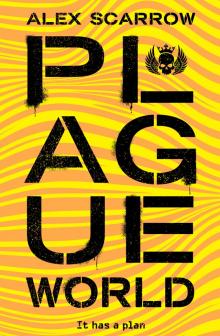 Plague World
Plague World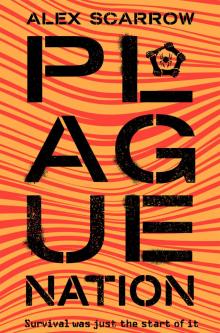 Plague Nation
Plague Nation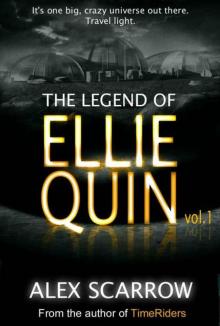 Ellie Quin Book 01: The Legend of Ellie Quin
Ellie Quin Book 01: The Legend of Ellie Quin Ellie Quin - 04 - Ellie Quin in WonderLand
Ellie Quin - 04 - Ellie Quin in WonderLand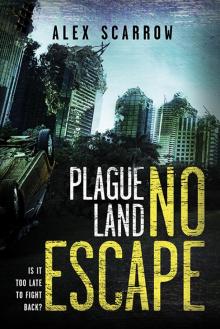 No Escape
No Escape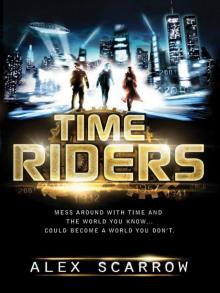 TimeRiders
TimeRiders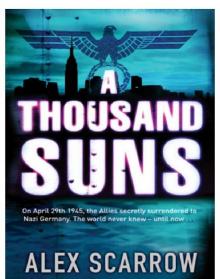 A Thousand Suns
A Thousand Suns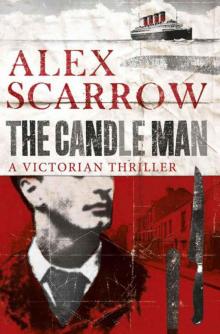 The Candle Man
The Candle Man The Pirate Kings
The Pirate Kings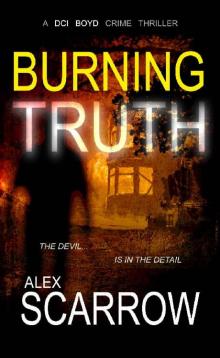 Burning Truth: An Edge-0f-The-Seat British Crime Thriller (DCI BOYD CRIME THRILLERS Book3) (DCI BOYD CRIME SERIES)
Burning Truth: An Edge-0f-The-Seat British Crime Thriller (DCI BOYD CRIME THRILLERS Book3) (DCI BOYD CRIME SERIES)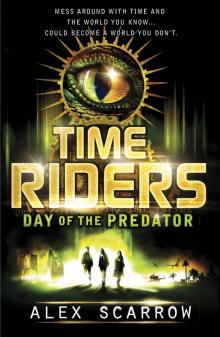 Day of the Predator tr-2
Day of the Predator tr-2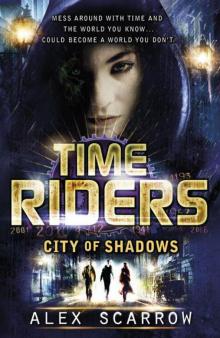 City of Shadows tr-6
City of Shadows tr-6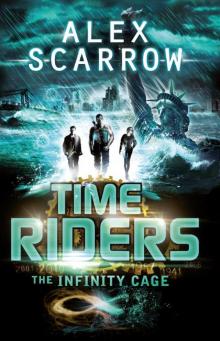 TimeRiders: The Infinity Cage (book 9)
TimeRiders: The Infinity Cage (book 9)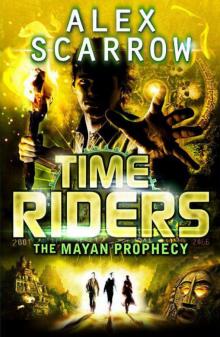 The mayan prophecy (Timeriders # 8)
The mayan prophecy (Timeriders # 8)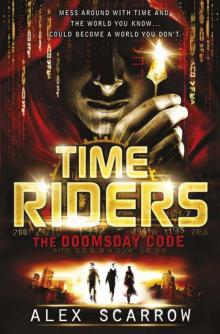 TimeRiders: The Doomsday Code (Book 3)
TimeRiders: The Doomsday Code (Book 3)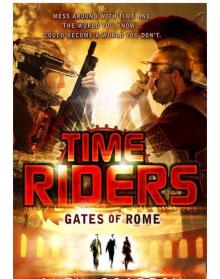 Gates of Rome tr-5
Gates of Rome tr-5 TimeRiders: The Pirate Kings (Book 7)
TimeRiders: The Pirate Kings (Book 7)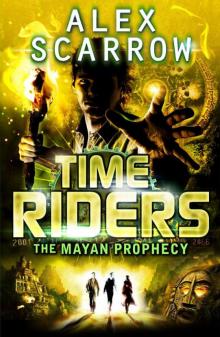 TimeRiders: The Mayan Prophecy (Book 8)
TimeRiders: The Mayan Prophecy (Book 8)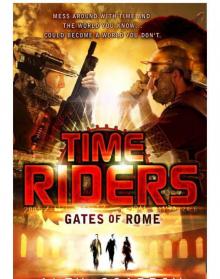 TimeRiders 05 - Gates of Rome
TimeRiders 05 - Gates of Rome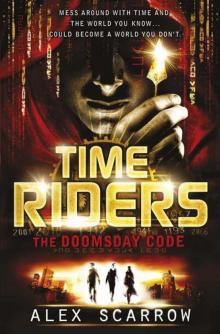 The Doomsday Code tr-3
The Doomsday Code tr-3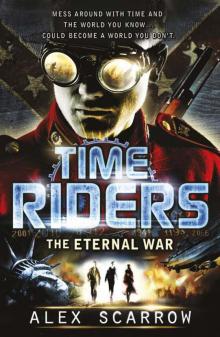 The Eternal War tr-4
The Eternal War tr-4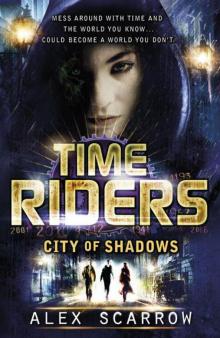 TimeRiders: City of Shadows (Book 6)
TimeRiders: City of Shadows (Book 6)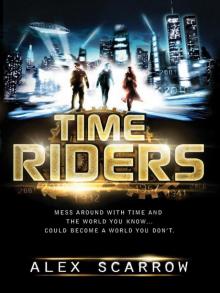 Time Riders tr-1
Time Riders tr-1 Afterlight
Afterlight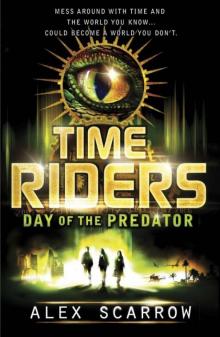 TimeRiders, Day of the Predator
TimeRiders, Day of the Predator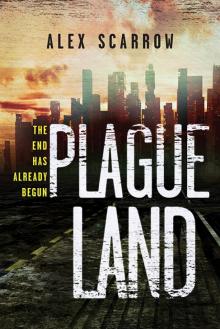 Plague Land Series, Book 1
Plague Land Series, Book 1